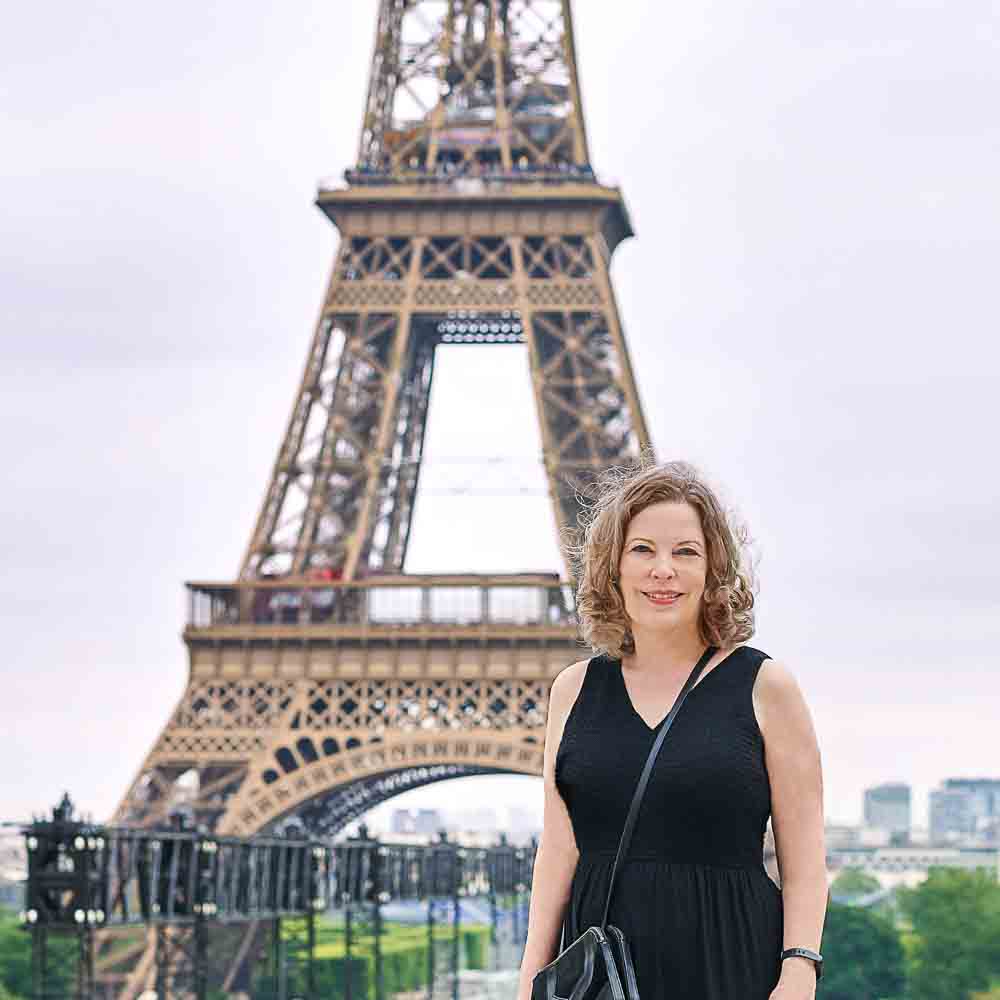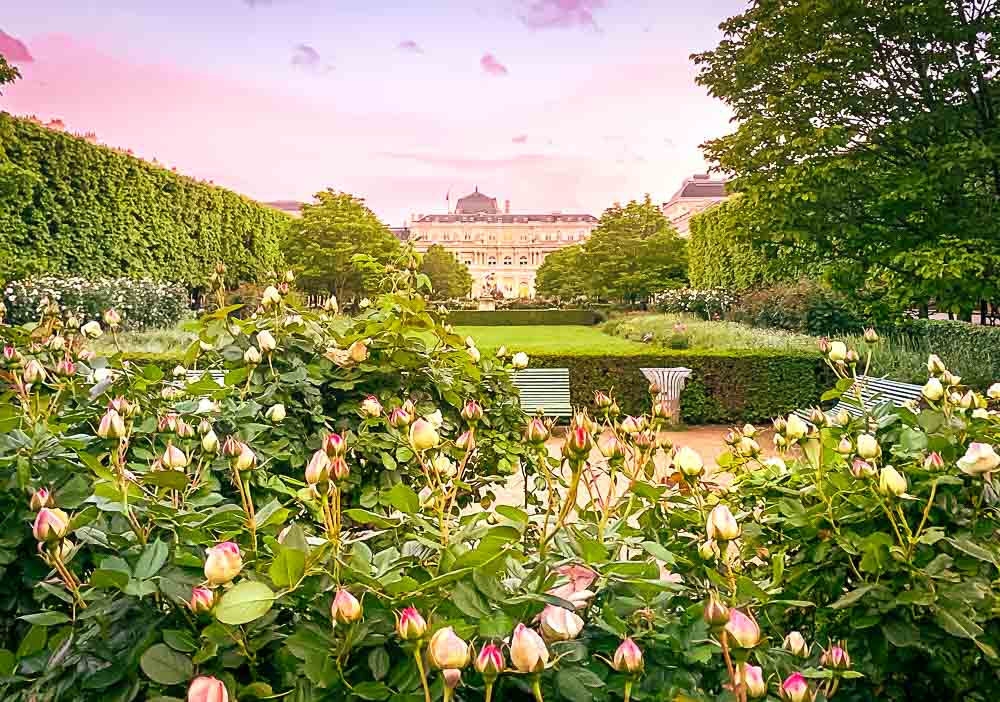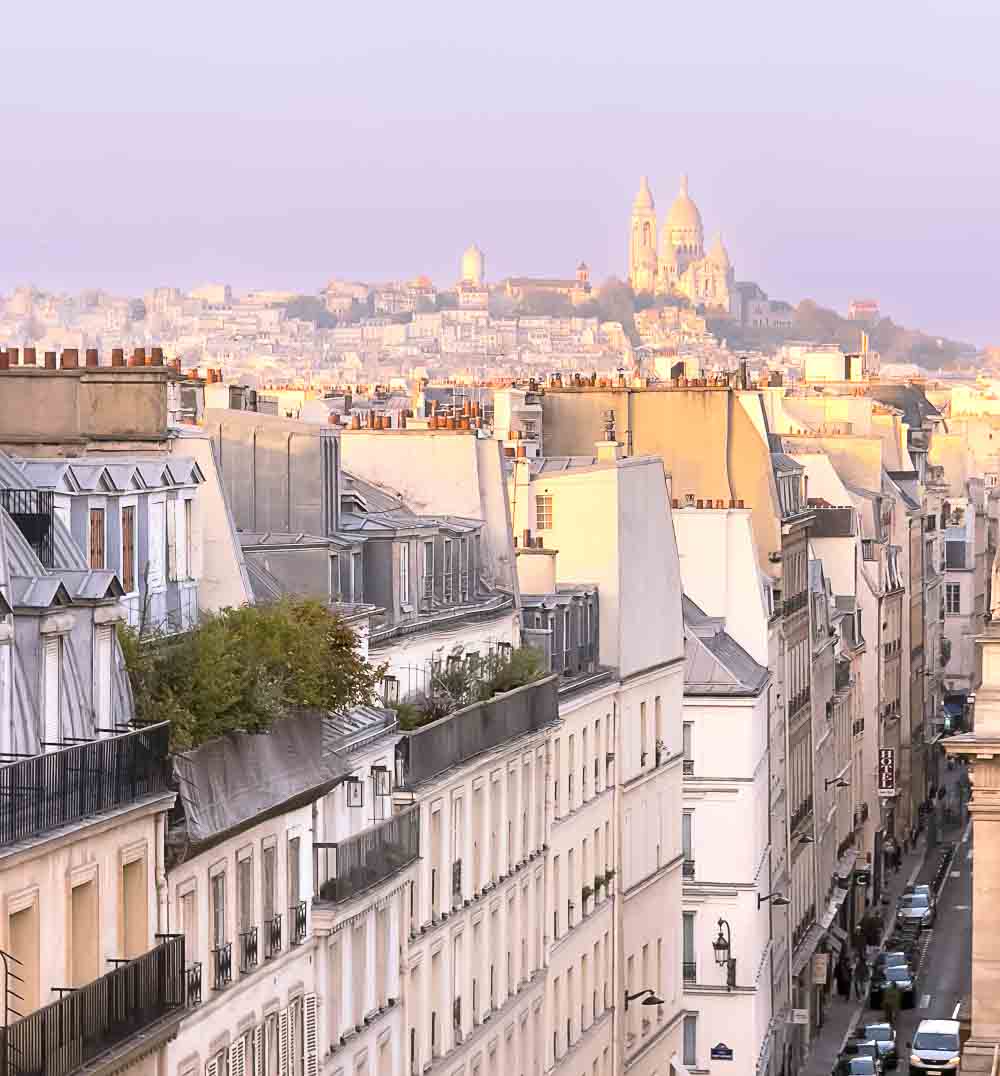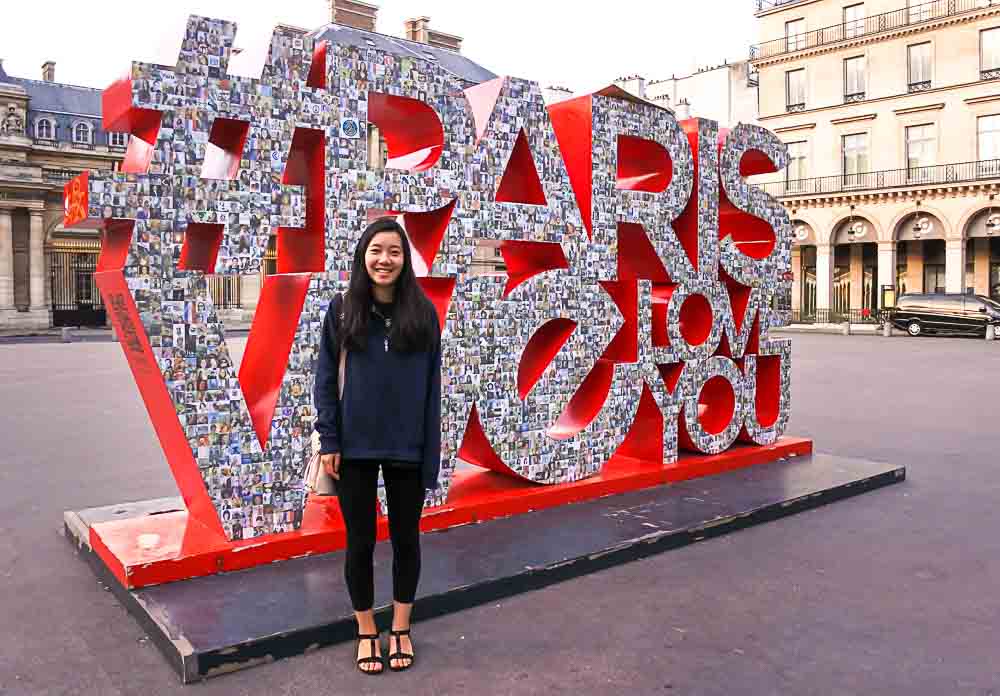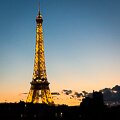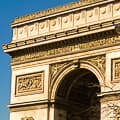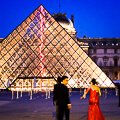If you are lucky enough to spend Bastille Day - known in France as La Fête Nationale (French National Day) or Le Quatorze Juillet (July 14th) - in Paris, you'll get to experience the biggest summer celebration in the city.
Bastille Day celebrations in Paris always take place on July 14, both the anniversary of the storming of the infamous Bastille prison in 1789 - a turning point for the success of the French Revolution and the end of absolute rule by monarchs - and a mostly forgotten event which took place a year later, the Fête Nationale Française, a celebration of France's short-lived constitutional monarchy.
Bastille Day is a national holiday throughout France.
Top Bastille Day Experiences
Looking for special things to do in Paris on July 14? Demand always soars on and near Bastille Day - so don't wait to book!
Top Paris attractions & experiences:
- Dinner Cruise, Cabaret, & Fireworks on July 14th (Bastille Day) - Choice of two boats offering a gourmet dinner and live singer, or a buffet with DJ and dancing, with both cruise boats offering wonderful views of the Eiffel Tower fireworks
- Bastille Day Celebration Cruise & Fireworks with 5-Course Dinner - Gourmet dinner with wine, 5-hour cruise, live music, breathtaking views of the Bastille Day fireworks at the Eiffel Tower - SOLD OUT
- Bastille Day Celebration Cruise with Picnic & Fireworks - Sightsee along the Seine on this affordable celebratory cruise, enjoy a delicious picnic meal, and watch the Bastille Day fireworks show - SOLD OUT
Also popular this month:
- Disneyland Paris 1-Day Ticket - Favorite family-friendly activity
- Skip-the-Line Versailles Palace Tour by Train from Paris - Top choice
- Giverny with Monet's House & Gardens Half Day with Transportation
- Eiffel Tower Entry Ticket with Optional Summit Access - Most popular choice
Paris Bastille Day events kick off with a military ceremony followed by a huge military parade down the Avenue des Champs Élysées and flyover by military aircraft to honor the men and women who defend France and the French people.
The spectacular Bastille Day fireworks show at the Eiffel Tower on the Champ de Mars starts at 11pm and lights up the sky for half an hour with an unforgettable riot of color, light, and excitement.
You can gather on the Champ de Mars with a blanket and picnic to relax and enjoy free concerts before the fireworks, attend one of the popular Bals des Pompiers (Firemen's Balls), cruise down the Seine river while enjoying dinner and fireworks, or visit one of the many museums open for the occasion.
Here are some additional ideas about what to do on Bastille Day in Paris in 2026:
- Take a 3-Hour Gourmet Food Tasting Tour of the Marais with a local guide - You'll explore the city's best-preserved medieval area, see top cultural sites, sample delicious food, wine, and French liqueurs along the way, and end up in Place de la Bastille.
- Combine fresh air, easy exercise, and sightseeing on the Paris Highlights 3-Hour Bike Tour to see the city's most important sites, plus a few special places known only to locals as your guide tells you fascinating stories about life in Paris.
- For a unique, only-in-France experience, celebrate Bastille Day by joining a Day Trip to Champagne with 8 Tastings & Lunch from Paris to the Champagne region. You'll visit a famous and a family-owned champagne maker as well as a family-owned winery where you'll learn about the process of making the special beverage, sample up to 8 glasses of champagne and wine - be sure to toast to Liberté, Égalité, Fraternité - and enjoy a French lunch with regional specialties. French Revolution connection? Many French kings were crowned in the cathedral in nearby Reims, the unofficial capital of the Champagne-growing region.
- Visit the Paris Conciergerie the infamous French Revolution prison when Marie Antoinette spent her last days during the Reign of Terror. More about what you can see and do here.
Find out Bastille Day's biggest parties: Firemen's Balls
Find more suggestions & details about the best places to watch the Bastille Day fireworks in Paris
Top photo: Bastille Day fireworks at the Eiffel Tower, (c) Paris Discovery Guide®
Paris Discovery Guide is a reader-supported publication. When you buy through my links, I may earn a small commission at no additional cost to you. Merci beaucoup for your support!
Bastille Day Fireworks and Free Concert at the Eiffel Tower
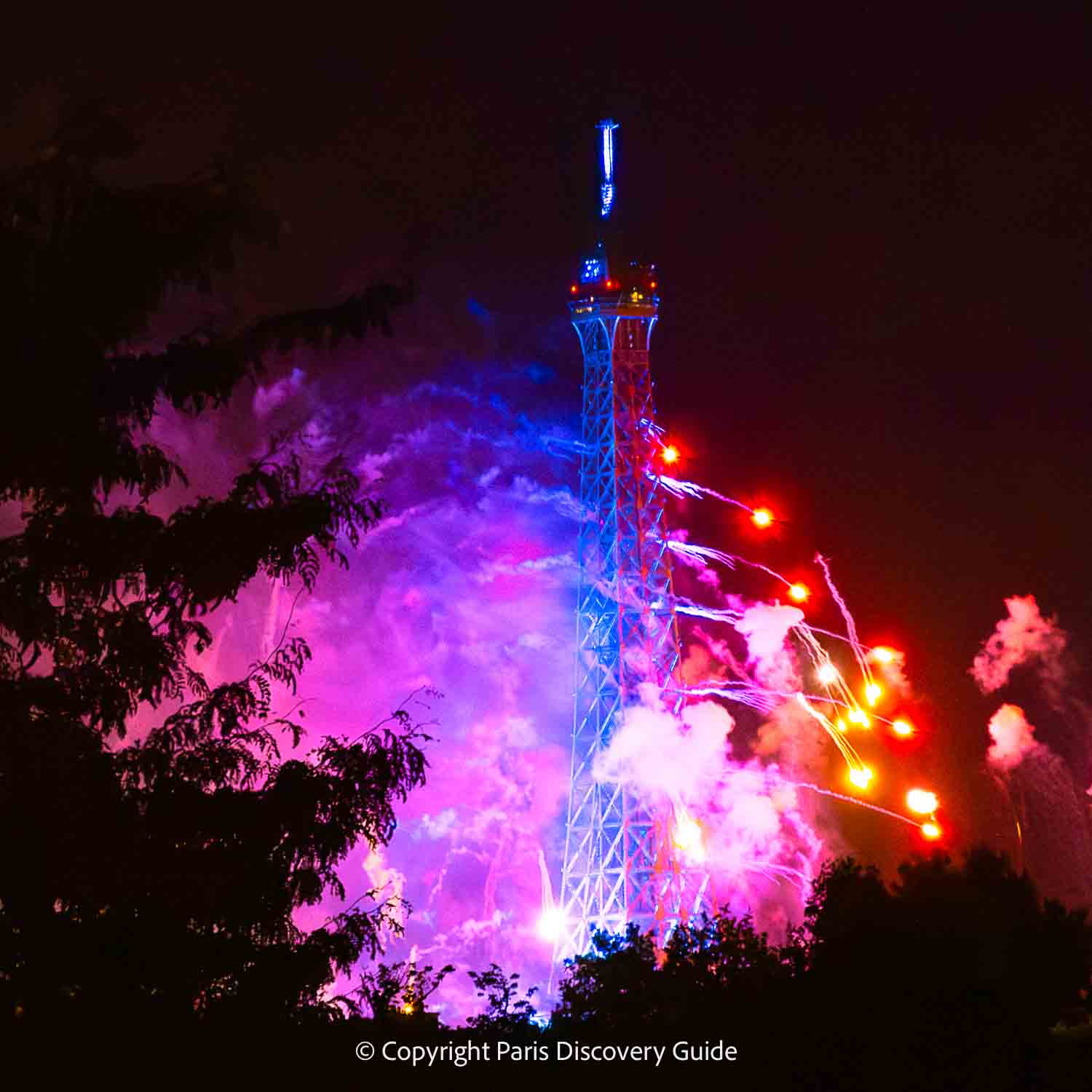
A truly spectacular Bastille Day fireworks show at the Eiffel Tower sends dazzling bursts of light across the Parisian night sky. The show follows a unique theme each year - and each year, you'll swear the display is the best ever.
Up to about a million Parisians and Paris visitors picnic and relax all afternoon on the Champ de Mars, the large grassy green space surrounding the Eiffel Tower, as they celebrate the French independence day.
If you want to drink wine or champagne as part of your picnic, start early because alcohol consumption is banned on Champ de Mars after 4pm.
Champ de Mars is also the site of free open air concerts through the early evening hours.
At 9:10pm, a special concert of classical music and opera featuring internationally acclaimed artists, the French National Orchestra, the Radio France Choir, and special lighting effects takes place at the base of the Eiffel Tower. It is also broadcast live on France Inter and France 2 TV.
Fireworks start at 11pm, once the sky is finally almost dark, and the show lasts about 30 minutes. Watch from the Champ de Mars, a Bastille Day dinner cruise on the Seine, from the river banks and bridges, and numerous other places around the city - more about them in a moment.
Bastille Day Fireworks Cruises
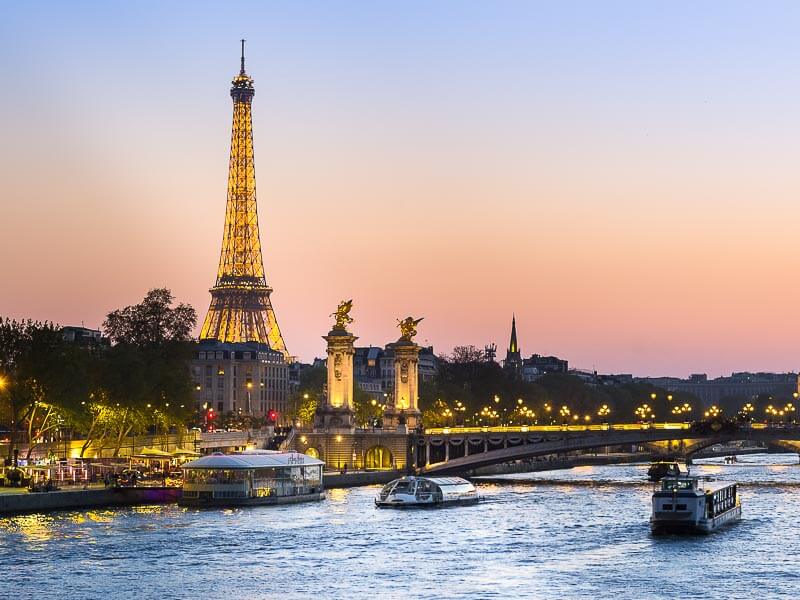
For an unforgettable experience, see the Bastille Day Paris fireworks from a cruise boat on the Seine. You'll enjoy dinner, fine wine, and perhaps music and dancing as you float past all the iconic landmarks along the Seine and then watch the dazzling fireworks overhead.
Seine River Fireworks Cruises: Excellent Views of Bastille Day Fireworks
If you want to enjoy excellent, unobstructed close-up views of the fireworks without spending much of Bastille Day camped out on Champ de Mars to secure your spot, special fireworks dinner cruises on the Seine offer a fantastic experience.
You'll enjoy dinner, wine, and perhaps music and dancing as you float past all the iconic landmarks along the Seine and then watch the dazzling fireworks overhead.
The most important thing for you to know: If you want to join one of the fireworks cruises, book as soon as you know your travel dates. They sell out much earlier than you might expect.
- Dinner Cruise, Cabaret, & Fireworks on July 14th (Bastille Day) - Choice of two boats offering a gourmet dinner and live singer, or a buffet with DJ and dancing, with both cruise boats offering wonderful views of the Eiffel Tower fireworks
- Bastille Day Celebration Cruise & Fireworks with 5-Course Dinner - Gourmet dinner with wine, 5-hour cruise, live music, breathtaking views of the Bastille Day fireworks at the Eiffel Tower - SOLD OUT
- Bastille Day Celebration Cruise with Picnic & Fireworks - Sightsee along the Seine on this affordable celebratory cruise, enjoy a delicious picnic meal, and watch the Bastille Day fireworks show - SOLD OUT
Other Seine River Cruises for Bastille Day
- 2-Hour River Seine Lunch Cruise - Enjoy a 3-course gourmet lunch, wine and other beverages, and wonderful sights along the river
- Happy Hour Evening Cruise on the Seine River - Buy you're favorite beverage onboard and enjoy the views along the river.
- 1 Hour Seine River Crulse - Depart from the Eiffel Tower - the most popular cruise!
More Seine River cruises to consider
Where to Watch Bastille Day Fireworks in Paris
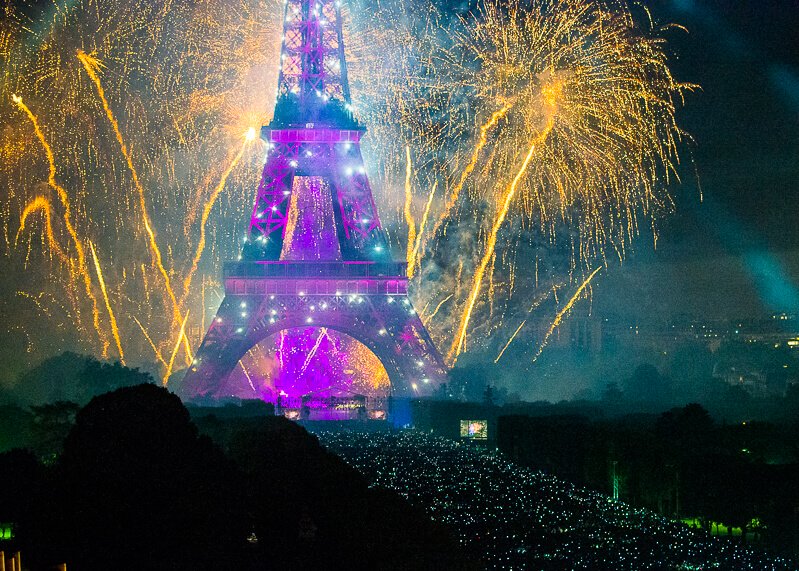
Where are the best places to watch the Bastille Day firework show in Paris, aside from the Seine River cruises?
Here are some possibilities:
- Any place along or near the river with Eiffel Tower views
- Seine River bridges
- Your hotel room, if you have an Eiffel Tower view (or if the hotel has a rooftop terrace open to guests)
- Nearby parks and public spaces with views, such as Tuileries Gardens and Place de la Concorde
- More distant parks with hillside views, such as Park des Buttes-Chaumont (19th arr)
- On top of Montmartre Hill (18th arr), either in front of Sacre Coeur or from any of the nearby streets where you can find unobstructed views
- Roof top bars and terraces (ask your hotel for nearby suggestions and help with reservations)
If you don't want to join the million or so Parisians on the Champ de Mars and don't have reservations on a Bastille Day fireworks cruise, don't worry. You will be able to see the fireworks show from any point in Paris where you can see the Eiffel Tower - and that includes a lot of places.
For close-up views, an area that's almost as popular as Champ de Mars (and sometimes even more crowded) is Trocadéro, across the Seine from the Eiffel Tower. Here, too, you need to arrive early to stake out your spot.
As with any densely crowded location almost anywhere in the world, take common-sense precautions in case of pickpockets by bringing only what you absolutely need for the day. For example, you might bring 10 euros in case you want to buy something to drink (although remember, bathrooms won't be readily available), a government-issued ID (as required by French law) such as your driver's licence, and the key to your hotel room or apartment.
If you don't plan to take photos with your phone, don't bring it.
Find more suggestions & details about the best places to watch the Bastille Day fireworks in Paris
Which Metro Stations & Streets Will Be Closed for the Bastille Day Paris Fireworks?
Keep in mind that numerous metro and RER stations near the Eiffel Tower will close by 7pm and will remain closed for the rest of the night.
Metro stations closed on Lines 6, 8, 9, 10, and 13 include: Kléber, Boissière, Passy, Trocadéro, Bir-Hakeim, Dupleix, La Motte-Picquet Grenelle, Cambronne, Sèvres-Lecourbe, La Tour-Maubourg, École Militaire, Invalides, Alma-Marceau, Iéna, Rue de la Pompe, Javel - André Citroën, La Motte-Picquet Grenelle, Église d'Auteuil, Avenue Émile Zola, Boulogne Pont de Saint-Cloud, Boulogne Jean Jaurès, Chardon Lagache, Charles Michels, Michel-Ange Auteuil, Michel-Ange Molitor, Mirabeau, Porte d'Auteuil, Ségur, Saint-François-Xavier, and Varenne.
Stations closed on RER C include: Pont de l'Alma, Champ-de-Mars - Tour Eiffel, Avenue du Président Kennedy - Maison de Radio France, Javel, and Invalides.
You'll also see signs about closures posted in advance in the stations.
Most city buses will run, but will be rerouted away from the crowds. You should expect major service disruptions and packed buses.
Security barricades will be in place in numerous locations.
Stay flexible, because the police may also close or block additional areas due to unpredicted security concerns.
So with these restrictions in mind, pick a fireworks viewing location that you can either walk to, or reach from a metro station well beyond the security zone.
Because of the massive crowds, congestion, and blocked off areas, this is not the night to count on getting a taxi or uber at any price!
Bastille Day Parade & Military Flyover
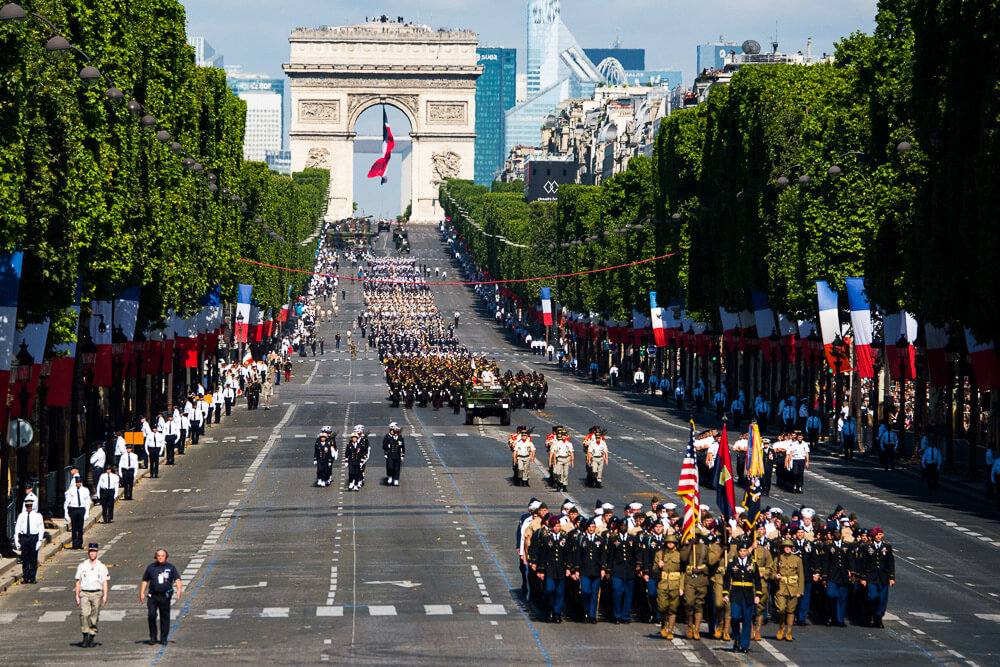
DoD photo by Navy Petty Officer 2nd Class Dominique Pineiro courtesy of Chairman of Joint Chiefs of Staff via Creative Commons license
Bastille Day celebrations in Paris kick off at 10am with formal military exercises at the Arc de Triomphe, starting with an impressive trumpet, bugle, and drum fanfare to announce the arrival of the President of the French Republic, who inspects the assembled military troops and presides over other ceremonies and tributes.
This year, the themes of the Fête Nationale parade include strategic solidary with allies, the commitment of young people, and 100-year anniversary commemorations of a couple of military and patriotic organizations.
At around 10:25, 39 military aircraft from the French Air Force and French Navy will perform a magnificent flyover across the city.
This will be followed by a show featuring the colors of the French flag performed by 9 Alpha Jets from the Patrouille de France, the elite precision aerobatic team famous for their tightly synchronized flight patterns.
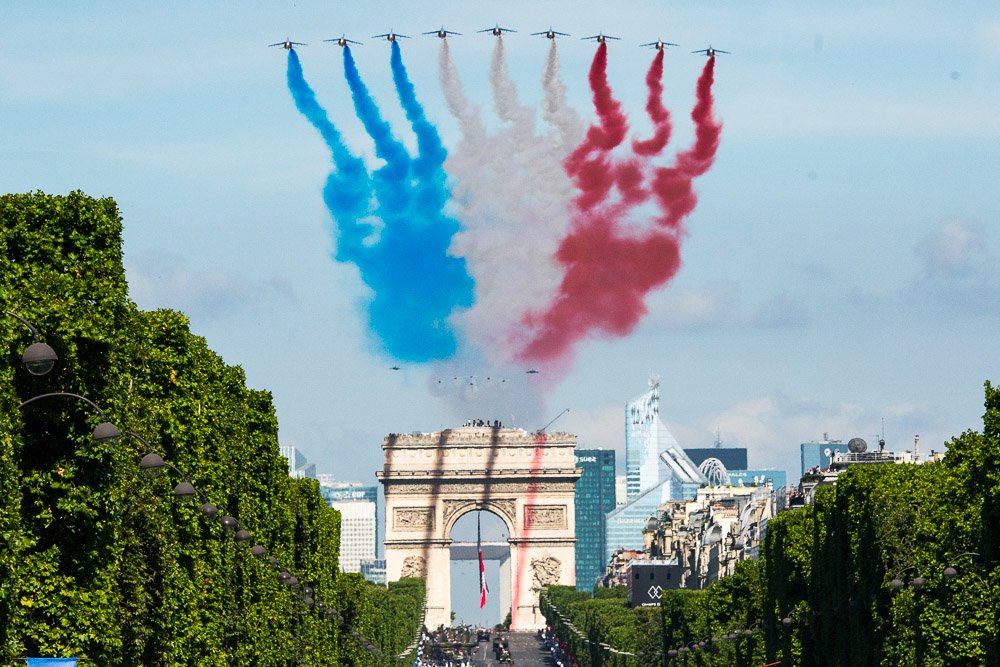
DoD photo by Navy Petty Officer 2nd Class Dominique Pineiro courtesy of Chairman of Joint Chiefs of Staff via Creative Commons license
A huge military parade down the Champs-Élysées from the Arc de Triomphe to Place de la Concord starts at about 10:30am and lasts over an hour. It includes representatives of elite French military regiments on foot, on horseback, and in vehicles - including tanks.
A helicopter parade takes place after the main parade.
You'll see about 7,000 women and men from the military, plus around 200 Garde Republicaine horses, 200+ tanks and other vehicles, and 102 airplanes and helicopters. Over 4,000 Republican Guard soldiers will march on foot.
This year's ceremonies honor Indonesia, other stragetic partnerships and the French armed forces in current areas of operational activities, and youth volunteers committed to solidarity.
By tradition, La Marseillaise, the French national anthem, will be performed by a group of about 150 singers.
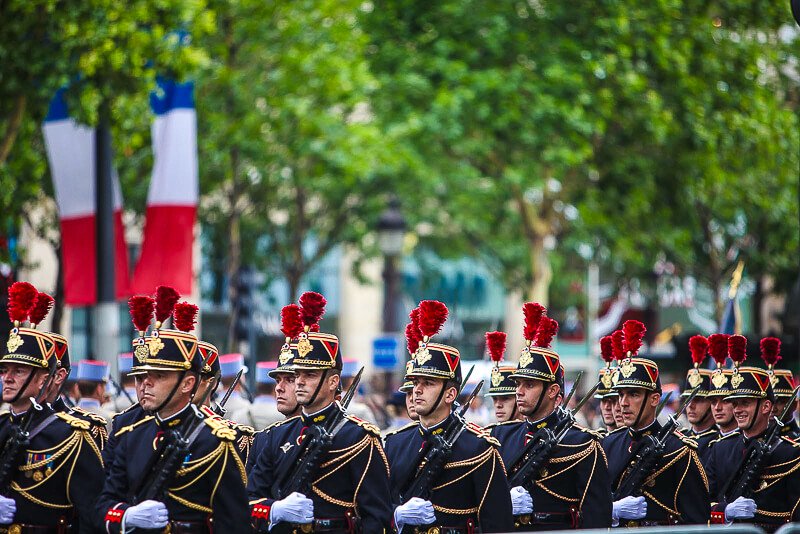
If you want to stake out a good viewing position for the parade, plan to arrive by 8am or even earlie.
Crowds are usually (unless the weather is bad) massive - partly because you must watch from behind barricades, which does not leave much room along the sidewalks. Keep in mind that you must also pass through a security check point.
Grand stands erected along Champs Elysees provide seating for about 30,000 viewers, which is only a small fraction of the usual number of spectators.
If you want to be sure of a superb view and plan ahead far enough in advance, you can reserve one of the rooms or suites overlooking the parade route at the 5-star Paris Marriott Champs-Élysées. You should expect the rates to be quite pricey - but the views will be priceless. Or, you can also try to snag seats on the upper level of one of the cafes along Champs-Élysées by stopping by a few days in advance and asking to reserve a window table.
But otherwise arrive much earlier than seems reasonable to get a position along Champs Elysees.
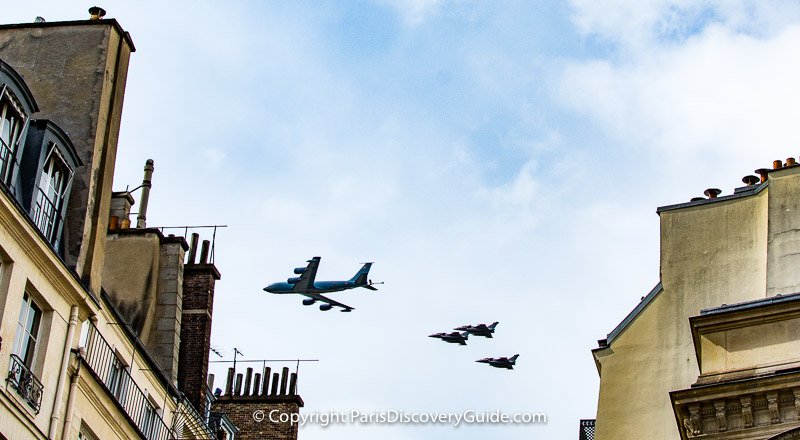
If you want to skip the parade but watch the military aircraft flyover, logistics are much easier - you can see the planes from many spots in the city.
Large parks such as Jardin des Tuileries (Tuileries Garden) and the Esplanade des Invalides (on the Left Bank) are both ideal viewing locations because your line of vision won't be blocked by nearby buildings.
Find out more about visiting the Arc de Triomphe
Which Metro Stations & Streets Are Closed for Paris's Bastille Day Parade?
About half a dozen metro stations fully or partially closed during the morning on 14 Juillet for the parade and flyover.
Metro stations closed from 6:30 am to 2 pm:
Metro stations closed on Lines 1, 2, 6, 8, 9, 12, and 13 include: Champs-Elysées Clémenceau, Franklin D. Roosevelt, George V, Charles de Gaulle-Etoile, Concorde, and Tuileries.
In addition, Porte Dauphine (Line 2) will also be closed this year.
Stations closed on RER A include: Charles de Gaulle-Etoile.
Right now, it appears that on the RER C, the Avenue Foch station will be open - but stay flexible because that could change.
Other nearby stations (Argentine, Ternes, Saint-Philippe-du-Roule, Madeleine, Kléber, Pyramides, Palais Royal, Alma-Marceau, Victor Hugo, and even Invalides, Musée, and Pont de l'Alma on the Left Bank) will likely be mobbed.
Consider using stations even further away from the parade route, and prepare to walk more than you might want in the July heat.
Avenue Foch and numerous other nearby streets will be closed to vehicles from 6:30am - 2pm, which means buses will be re-routed to avoid the area.
Expect heavy security in the entire area.
And remember, the police may also block additional areas due to security concerns, so be aware that you may have to walk even further than you might have anticipated.
Bastille Day's Biggest Parties: Firemen's Balls across Paris
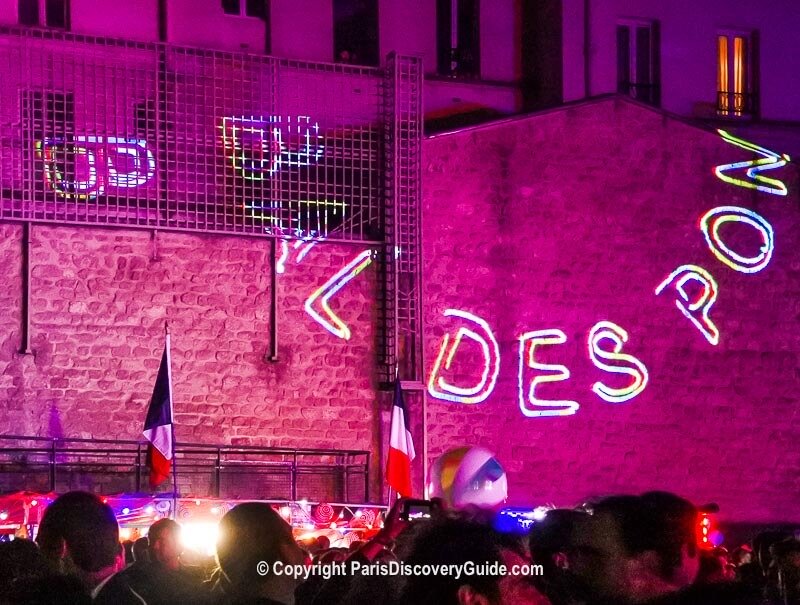
After the Bastille Day fireworks end, festivities continue all over the city at les Bals des Pompiers (Firemen's Balls), organized by fire stations throughout Paris in a tradition that started a century ago.
In case "ball" conjures up visions of formal attire and a stuffy ambiance, rest assured that these balls are just the opposite: informal, outdoor parties with lots of music, dancing, champagne, and fun.
The Firemen's Balls take place on July 13 and 14, and start at 9pm and last until 4am. They are open to the public, almost free (some stations ask for donations of a few euros), and a wonderful way, if you're a visitor, to experience the "real" Paris!
More about Bals des Pompiers and their locations in Paris
Tips for Staying Comfortable in Paris on Bastille Day
July weather in Paris can be broiling hot, so don't take changes with dehydration and sun stroke, especially if you're spending the day staking out your spot on Champ de Mars for watching fireworks later in the evening.
Wear comfortable walking shoes, slather yourself with sunscreen, and strongly consider wearing a hat or cap.
Most important: bring a water bottle (or two). If you need one, these lightweight collapsible BPA-free silicone water bottles available from Amazon fold up to almost nothing and are perfect for travel. Also, my experience has been that they don't leak - always a plus!
If you run out of water, you can refill your bottle at any of the city's ornate Wallace Fountains (and other public fountains). Paris has about 1,200 outdoor drinking fountains - bonus points if you find one of the 15 or so that dispense chilled carbonated water!
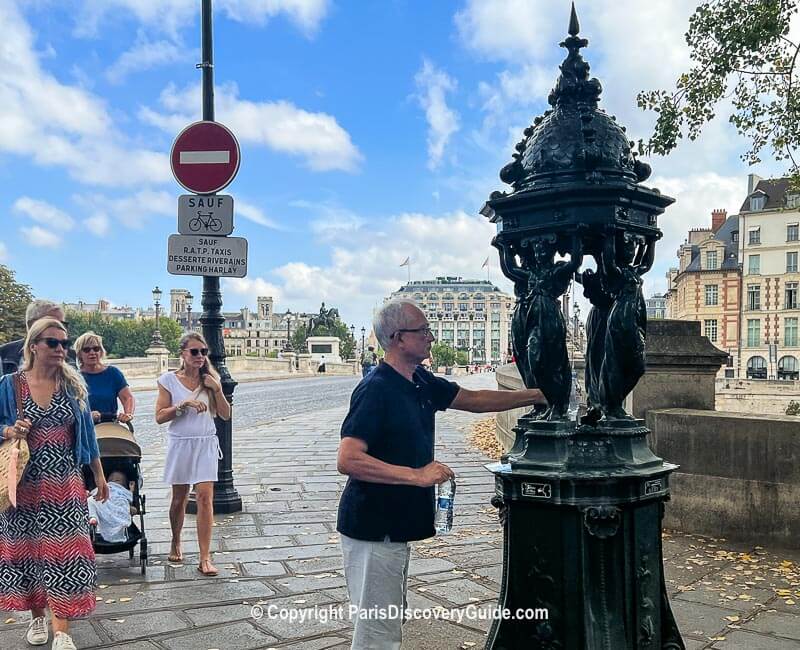
In case you're wondering, Paris tap water is safe to drink, thanks to extensive daily testing. In my opinion, it also tastes quite good - no hint of chlorination or other chemicals.
The only rare exception is if you see a sign on the fountain saying "Eau non potable," which means "don't drink the water."
Usually the problem stems from a broken dispensing mechanism within the fountain, rather than anything to do with the water quality. But regardless of the reason, find another fountain.
Worried about hot weather on Bastille Day? Find out how to beat Paris heat waves
French History Refresher: Why Bastille Day is a French National Holiday?
Similar to Independence Day on July 4 in the United States, Bastille Day celebrates the overthrow of a repressive absolute monarchy, the end of feudalism, and the beginning of democracy in France during the French Revolution of 1789.
Although pressure against France's all-powerful rulers had been brewing for decades, revolution began in earnest in 1787 amid a severe economic crisis and an ineffective out-of-touch king, Louis XVI, and his wife, Marie-Antoinette.
On July 14, 1789, anti-Monarchist forces in search of gunpower and weapons stormed the Bastille, a medieval fortress dating back to the 1300s, and freed its prisoners.
Although only seven prisoners were incarcerated, mostly for non-political reasons, the Bastille's past as a prison for political dissidents meant its fall held great symbolic meaning to the revolutionaries - and the 30,000 pounds of gunpowder they seized there no doubt proved useful from a practical perspective.
Even more significant: while the Bastille was being stormed, Royalist troops stood by without intervening - a signal heard across across Paris and the rest of France that Louis XVI no longer fully controlled his army.
How big was the group of armed and angry citizens who stormed the Bastille? Most estimates range from just over 600 to around 900 people, although the supportive crowd that gathered in the aftermath is believed to have been much larger.
A few weeks later, on August 4, 1789, the French Assembly adopted the "Declaration of the Rights of Man and of the Citizen," which officially abolished feudalism and adopted a system based on equal opportunity, freedom of speech, and a representative government - thereby undermining the power of the monarchy - but with King Louis XVI still in place as a new "citizen king" rather than an absolute monarch.
Almost a year later, on June 14, 1790, the Fête de la Fédération celebrated France's short-lived constitutional monarchy with a military parade as most people breathed a sign of relief, thinking the revolution had ended with order restored.
However, the initial Revolution soon morphed into the Reign of Terror and raged on for another 10 or so years, finally winding down for awhile when Napoleon Bonaparte took control and the country adopted a new constitution in 1799. But by 1804, Napoleon had become an authoritarian ruler and declared himself emperor, only to be defeated and exiled 10 years later by other European powers in 1814. At that time the monarchy was briefly restored, until Napoleon broke out of prison and seized power again.
Permanently eliminating rule by monarchy took two more major revolutions - one in 1830 and another in 1848, and the practice of revolting against repressive regimes continued into the 20th century, notably with Popular Front riots in the 1930s and the student uprisings against the de Gaulle regime in May, 1968.
Despite all of this turmoil, the Fête de la Fédération - now called the Bastille Day Parade or the Fete Nationale Parade - has continued every year since 1790 (except during the years of the Nazi occupation during World War II and in 2020 as the coronavirus pandemic launched its own assault), making it the oldest military parade in the world.
So if you are in Paris on Bastille Day, join in the festivities and raise a glass to salute France's hard-won liberté, egalité, fraternité!
More Things to Do on Bastille Day in Paris
Most large museums (and some smaller ones), department stores, and shopping complexes in Paris will be open on Bastille Day. And remember, the final days of the summer sales are still underway with the steepest markdowns now on offer.
The Arc de Triomphe is opens in the afternoon after the Bastille Day Parade concludes.
You should expect to large crowds at the most popular museums and outdoor attractions - the Louvre, Orsay, Picasso, Catacombs, Centre Pompidou, Paris Zoological Park, Jardin d' Acclimatation - so consider heading to less well-known venues - Dali Paris, the Conciergerie, Guimet Museum, Grand Perfume Museum, Science and Industry Museum, the Museum of Modern Art of the City of Paris.
Paris parks including Jardin d'Acclimatation in Bois de Boulogne and Bois de Vincennes/Parc Zoologique de Paris (Vincennes Zoo) are all open, along with some of the larger public swimming pools (Paris Plage pools, Piscine Pontoise in the 5th, Josephine Baker in the 15th, the huge Aquaboulevard water park in the 15th, Champerret in the 17th, and Georges Vallerey in the 20th).
At Tuileries Garden in the 1st arrondissement, check out the huge carnival with its gravity-defying ferris wheel (and great views of the Paris skyline from the top), bumper cars, games of all sorts, and lots of food and beverage choices.
On Bastille Day, the Carnival typically opens in early afternoon after the military parade ends, and then closes a little earlier than usual before the fireworks begin.
Many neighborhood bakeries and small produce stores will be open (although in the morning only in some cases) so that Parisians can buy picnic supplies; many local residents spend at least part of Bastille Day relaxing in a park with family, friends, food, and wine.
The metro and city buses run as usual - except for the station closures around Champs-Élysées and the Eiffel Tower/Champ de Mars mentioned above.
In reality, traffic anywhere in central Paris will be gridlocked due to the street closures, so plan to do a lot of walking in you're in that area. To repeat: wear plenty of sunscreen and don't forget your water bottle!
Find Out More about the French Revolution in Paris & Its Connection with Bastille Day
Even though little remains of the infamous Bastille prison, many of the other buildings and sites where the Revolution took place remain.
The best way to see these places in context is to join a French Revolution tour led by an expert guide - or visit Versailles Palace, the epicenter of the excess that helped trigger the uprising:
- French Revolution Walking Tour - Learn about the fascination story of the French Revolution as you explore the famous Paris landmarks associated with this historical event. Reserve your place
- Versailles Skip-the-Line Half-Day Tour & Hotel Transfer - Experience the lavish palace and gardens enjoyed by French kings and queens including Marie Antoinette, as an expert guide shows you the famous Hall of Mirrors, State Apartments, King's Bedroom, and more. Find out more
For a fascinating although chilling description of the French Revolution by a royal eyewitness, here is an account of events from October 1789 through June 1795 written by Marie-Thérèse, the oldest daughter of King Louis XVI and Queen Marie-Antoinette, and the only one of their children to survive to adulthood.
Find out Bastille Day's biggest parties: Firemen's Balls
Find more suggestions & details about the best places to watch the Bastille Day fireworks in Paris
More Fun Things to Do & See in Paris
More Articles about Things to Do & See in Paris
- Paris Museum Shows - Find out all the special exhibitions going on right now
- Arc de Triomphe - What to see & do, including the Rooftop Terrace
- Why you should visit the Conciergerie, a medieval palace & French Revolution prison
- Easy Day Trips from Paris - How to visit Versailles, Giverny, Mont Saint Michel, D-Day Normandy Beaches, Disneyland, London, Bruges, & more places in just one day
- Skip the Line Tickets - Why waste time standing in long lines when you don't have to?


